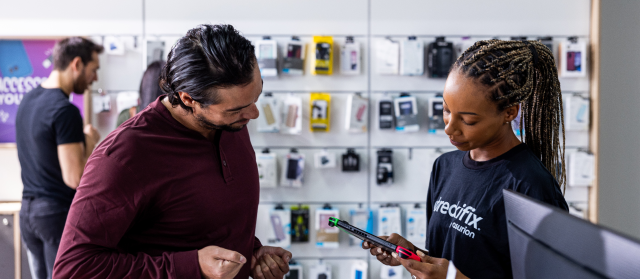When you insert an SD card into your Mac® expecting a seamless transfer of photos or files and nothing happens, it can be perplexing. It leaves you wondering, “Why is the SD card not showing up on my Mac?”
Don’t worry, we’re here to help unravel the mystery.
At uBreakiFix® by Asurion, we know tech. From factory resetting your Mac to diagnosing a software problem—we’ve got all of your tech care needs covered. Here’s what our experts have to say about getting your Mac to recognize your SD card.
Common reasons for SD cards not showing up on Mac
Whether you're looking to edit photos, access large media files, or just trying to offload files to free up space, encountering issues with your SD card not showing up on your Mac can throw a wrench in your plans. Understanding why your Mac is not recognizing your SD card is the first step in troubleshooting.
- Incompatible SD card reader. Some SD card readers may not be compatible with your Mac model or the SD card format.
- Physical damage to the SD card. Damage to the SD card itself can prevent it from being read by your Mac.
- Software conflicts. Occasionally, software issues within the Mac can cause it not to recognize an SD card.

You can’t work when your computer doesn’t want to
Get it repaired fast at one of our stores. Just stop in or make an appointment⎯we'll handle the rest.
What you can do for a Mac not reading an SD card
There are a few ways to fix a Mac not recognizing your SD card. Try these steps if your card reader needs help.
1. Ensure proper connection and orientation of the SD card
Make sure the SD card is inserted correctly into your Mac card reader slot. The card should click into place.
2. Restart your Mac
A quick restart can resolve minor software glitches that may be preventing the SD card from being recognized. Save your work if you can and follow these steps to restart your Mac:
- Click the Apple® menu icon > Restart.
- If your Mac doesn’t restart, press and hold the Power button on your computer for about 10 seconds or until it turns off. Then turn your Mac back on.
3. Try different SD cards
Your SD card could be a dud. Test your card reader with another SD card to determine if the issue is with the card itself or your Mac computer’s card reader.
4. Test the SD card reader's functionality
Use a different card reader to see if the issue is with the reader rather than the SD card. If you have a USB-C to SD card reader on hand, try swapping the card readers.
When using a USB-C to SD card reader adapter, you’ll want to try your adapter in another USB-C port to rule out port damage being the reason your computer isn’t reading your SD card.
5. Reset the NVRAM/PRAM
Resetting the Non-Volatile Random-Access Memory (NVRAM) or Parameter RAM (PRAM) can sometimes resolve hardware recognition issues on your Mac.
This step won’t erase your data—though it’s never a bad idea to back up before starting a reset.
- Power your Mac off.
- Press the Power button, then immediately press and hold the Option, Command, P, and R keys simultaneously for about 20 seconds. This action will reset the NVRAM/PRAM.
6. Data recovery service
If your SD card contains essential data that you can’t access, consider contacting a professional data recovery service for help.
If you've tried these steps and still need a little help, we're right around the corner. Schedule a repair at the nearest uBreakiFix® by Asurion store and our certified experts can get your device back up and running as soon as the same day.

